Search the Special Collections and Archives Portal
Search Results

Transcript of interview with Marilyn Glovinsky and Melissa Lemoine by Barbara Tabach, April 2, 2015
Date
Archival Collection
Description
Marilyn Glovinsky discusses her upbringing in New York and moving to Las Vegas. She was involved in establishing Congregation Ner Tamid. Her daughter, Melissa, talks about growing up in Las Vegas and attending Hebrew Academy.
Marilyn Glovinsky was born January 20, 1942 in Brooklyn, New York, the daughter of a teacher, Lilyan, and police sergeant, Solomon Goldberg. Marilyn split her childhood between New York City and Los Angeles, where she spent the summers with her maternal grandparents. In 1963, she graduated with a bachelor?s degree in speech pathology from Brooklyn College. A year later she married, and the couple soon moved to Salt Lake City, where her husband had been hired as a graduate assistant at the University of Utah. In Salt Lake City, Marilyn worked as a first grade teacher. It was there that she attended her first High Holidays service, at the Reform synagogue. It wasn?t long before her husband enlisted in the United States Navy, and they were stationed Camp Legeune, North Carolina, for nearly three years. The couple later moved back to Utah, where their children Melissa and David were born. In June of 1974, Marilyn and her family moved to Las Vegas. She quickly integrated herself into the Jewish community, and was amongst a small group of families that started Congregation Ner Tamid. She went on to play a critical role in the growth of the synagogue, including taking on an interim operations management role at one time, and also leading the development of the Hebrew School, to tremendous success. Marilyn?s daughter has emulated her mother?s dedication to making Judaism accessible to members of the local community, particularly through education and social activities. Even as a fifth grader at the Hebrew Academy, Melissa took on additional responsibilities, assisting in the school office. Now, in addition to her job as a teacher at Doral Academy, Melissa teaches b?nai mitzvah, conversion and Hebrew School classes at Ner Tamid. She also leads programming for NextGen, a group dedicated to creating community amongst young Jewish adults in their 20s and 30s. Melissa is married to Todd Lemoine, and they have one child named Colton.
Text

Transcript of interview with Roscoe Wilkes by Claytee White, March 19, 2009
Date
Archival Collection
Description
Roscoe Wilkes was born in Bonanza, Colorado, and moved with his family to Pioche, Nevada for what his sister called a 75-year pit stop. Soon after their move to this rural Nevada town, Roscoe’s mother became a widow, raising two children during the Depression. Like many families in Pioche, the Wilkes’ made due with what they had, and were creative in sustaining their livelihoods. Roscoe has never stood still. Before enlisting in the military, Roscoe worked various jobs, as a PBX systems operator, a lead zinc miner, and grade school teacher, before enlisting. During World War II, Roscoe became a prisoner of war in Romania, and was rescued a few months later when the Germans began retreating. Returning to the United States after his release, he relocated to a base in California, and married. As soon as Roscoe was relieved of his military service, he took advantage of the then new G.I. Bill and enrolled in the University of Southern California School of Law. He immediately took his degree to Pioche, soon becoming its district attorney, and later a judge. He spent 18 years based in Seattle as a federal administrative law judge, hearing cases prosecuted by the Coast Guard. Roscoe ended his 45-year career in law in 1990, and moved to Boulder City, where four generations of Wilkes live.
Text
Hannah Werner oral history interview, 2024 August 30
Level of Description
Scope and Contents
Oral history interview with Hannah Werner conducted by Claytee D. White and Stefani Evans on August 30, 2024 for the UNLV Remembers: an Oral History of the 6 December 2023 Shootings project. In this interview, Werner, a junior in UNLV's Film School, recalls leaving her dorm and heading to class in Flora Dungan Humanities building at 11:30am. Shortly after class began, she and her classmates started receiving the University Police Department (UPD) active shooter texts. The class decided to remain in place, stacking desks against the door and turning off the lights. Hebbler suggested the students call their families. Werner was talking to her father when she heard gunshots. When the building was being evacuated, they heard banging on the door and loud voices. Realizing it was the police, Werner put on her backpack backwards, and when they opened the door were faced with guns. The class was evacuated about 3:00pm around the building and out the stairs facing Maryland Parkway. Werner started filming as they were being evacuated, sent her film to the networks, and was later interviewed by CBS News. Her dad, a Spanish teacher, was waiting for her near some nearby apartments, and they took a classmate home on their way home that night. Her class met in video calls every night over the next few weeks; Werner is still close with all her classmates. Werner, a substitute teacher, says the event has made substituting harder, is more aware of her surroundings and emergency exits, and looks to Hebbler as a role model for the way he remained calm and kept his students calm. Digital audio and transcript available.
Archival Collection
Collection Name: UNLV Remembers: an Oral History of the 6 December 2023 Shooting interviews
Box/Folder: Digital File 00 (Restrictions apply)
Archival Component
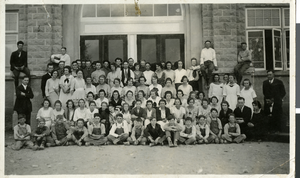
Postcard of the students and principal of Overton High School, circa 1930s
Date
Archival Collection
Description
Image

Transcript of interview with Thalia Dondero by Susan Scott, March 18, 1978
Date
Archival Collection
Description
On March 18, 1978, Susan Scott interviewed Thalia Dondero (born 1921 in Greeley, Colorado) about her experiences in Nevada and more specifically about her work as a Clark County Commissioner. Dondero first speaks about her background and the circumstances which led her to move to Las Vegas. She also talks about her children, her work with the Parent-Teacher Association, and her service with the Nevada State Park Commission. She also mentions some of her lobbying work for the development of state parks, including a project by National Geographic in which she visited multiple parks, and she later describes the development of the Las Vegas Strip. At the end of the interview, Dondero talks about her involvement in various organizations, her consideration for running for governor, and some of the topics she handles as a commissioner for the county.
Text
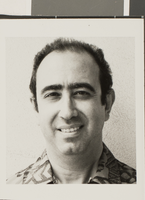
Photograph of Jerry Diloro, 1982
Date
Archival Collection
Description
A portrait of English instructor Jerry Diloro at the University of Nevada, Las Vegas (UNLV).
Image
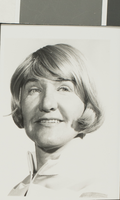
Photograph of Dr. Jessie Carnevale, 1973
Date
Archival Collection
Description
A portrait of Dr. Jessie Carnevale, the Associative Professor of Law Enforcement at the University of Nevada, Las Vegas (UNLV).
Image
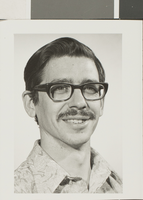
Photograph of David H. Bennum, 1973
Date
Archival Collection
Description
A portrait of Professor of Physics David H. Bennum at the University of Nevada, Las Vegas (UNLV).
Image
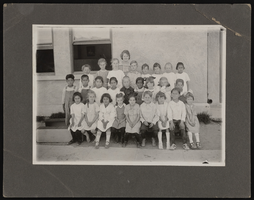
Photograph of school children, Las Vegas (Nev.), 1905-1915
Date
Archival Collection
Description
Image

